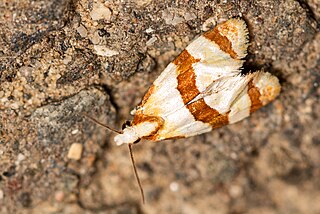
Phalonidia is a genus of moths belonging to the subfamily Tortricinae of the family Tortricidae.

Phalonidia contractana is a moth of the family Tortricidae. It is found in southern Europe, Dalmatia, Macedonia, Hungary, Romania, Bulgaria, Greece, Ukraine, southern Russia (Sarepta), Uralsk, Turkey, Kuldscha, Afghanistan, Kashmir, Lebanon, China, Iran, Pakistan and Kyrgyzstan.

Phalonidia manniana is a moth of the family Tortricidae. It is found in most of Europe.

Phalonidia aetheria is a species of moth of the family Tortricidae, the subfamily Tortricinae, and the tribe Cochylini. It is found in Brazil, in the states of São Paulo, Santa Catarina and Goias.

Phalonidia affinitana, the large saltmarsh conch or large saltmarsh bell, is a species of moth of the family Tortricidae, the subfamily Tortricinae, and the tribe Cochylini. It is found in China, Japan, Korea, Russia and most of Europe. Its habitat consists of salt marshes.
Phalonidia tenuispiniformis is a species of moth of the family Tortricidae. It is found in China.
Phalonidia melanothicta is a species of moth of the family Tortricidae. It is found in China and Japan.
Phalonidia lydiae is a species of moth of the family Tortricidae. It is found in China, Japan, Korea and Russia.
Phalonidia fraterna is a species of moth of the family Tortricidae. It is found in China, Korea and Russia.

Phalonidia curvistrigana, the golden-rod conch, is a species of moth of the family Tortricidae. It is found in China, Japan, Korea, Russia and most of Europe. The habitat consists of woodland and scrubland.

Phalonidia albipalpana is a species of moth of the family Tortricidae. It is found in southern Europe, Russia, Asia Minor, the Thian Shan Mountains and Uzbekistan. The habitat consists of wooded alkaline meadows.

Phalonidia gilvicomana, the wall-lettuce conch, is a species of moth of the family Tortricidae. It is found in most of Europe. The habitat consists of woodlands, downlands and waste grounds.
Phalonidia campicolana is a species of moth of the family Tortricidae. It is found in the United States, where it has been recorded from California, Washington, Maine and Minnesota.
Phalonidia plicana is a species of moth of the family Tortricidae. It is found in North America in Sonora and California.
Phalonidia subolivacea is a species of moth of the family Tortricidae. It is found on the Virgin Islands and Puerto Rico.
Phalonidia amasiana is a species of moth of the family Tortricidae. It is found in Turkey and Ukraine.
Phalonidia olivogrisea is a species of moth of the family Tortricidae. It is found in Peru.
Phalonidia cholovalva is a species of moth of the family Tortricidae. It is found in Venezuela.
Phalonidia fulvimixta is a species of moth of the family Tortricidae. It is found in Primorsky Krai in the Russian Far East and in China.
Phalonidia walkerana is a species of moth of the family Tortricidae. It is found in Peru.







